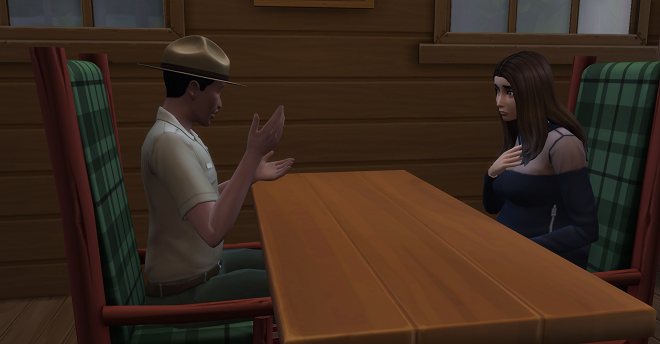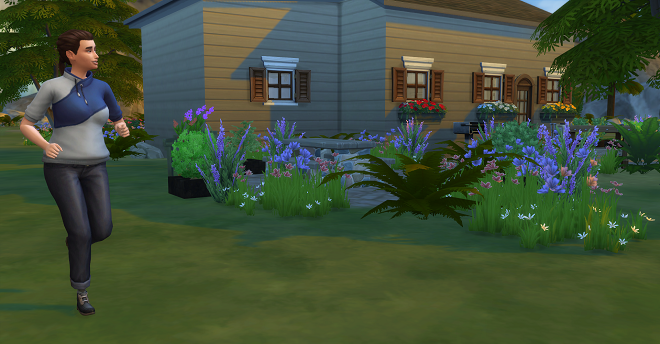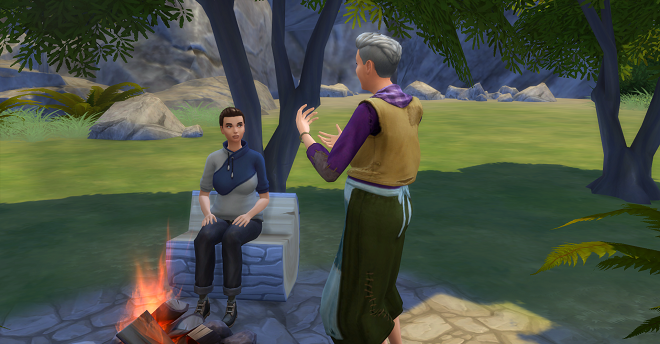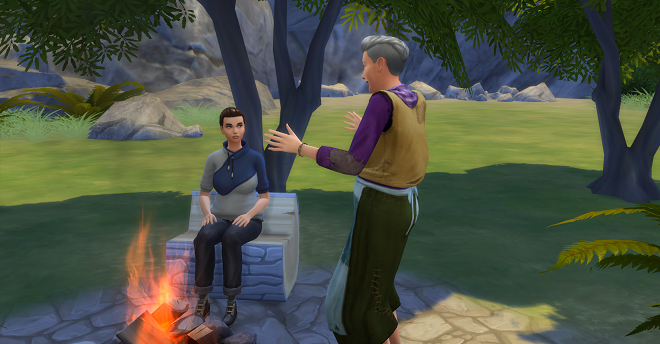
I had some trouble finding my way in the back country, in spite of my self-professed talent with topographical maps.
I had to follow deer trails up there, generally not a problem, but I hadn’t counted on them criss-crossing quite so much.

When the ranger had stopped by the night before, he’d warned me about this.
“I can take you up there myself,” he said, “but not until Saturday. Can’t leave my post before then.”

His connection with Ritu and the refugee program was personal, not professional, and he didn’t want to risk alerting anyone to the transfers that had been happening across federal property.
“I’m not sure I should wait that long,” I said. We’d heard reports of AAC riots planned for the weekend, so we wanted to be home well before then.
“All right,” he said. “Just use common sense, then. Don’t get hurt. Don’t get injured.”

I gained confidence when I spotted Finger Rock. Below it was a crevice through the granite, and if I could climb through it, I’d come out in the high meadow where Ritu’s friend lived, just beyond the national park border.
This was the first winterless year we had. It was February, and already, what little snow had fallen in late December and early January had melted from all but the highest peaks. Bird song broadcast an early breeding season, and wildflowers bloomed two months too early.
In spite of my better wisdom, I got caught up in the excitement of early spring—-the sun, the songs, the blooms, the whispers of warmth, it was hard not to feel alive and vibrant, though I knew that this disruption of normal patterns signaled nothing good to come, even for those very chickadees and warblers now celebrating spring.

The significance hit me when I arrived in the high country to see the shrubs already in leaf.

A tidy cabin with a well-cared-for alpine garden stood at the far end of the meadow, across from the sign marking the park border.
This was where Ritu’s friend lived. This was where I’d meet the refugee.

There was no one home.
Tired from the trek, I lay down in the meadow, near the cabin. I’d hear them when they came back.

A peregrine flew overhead. It was early for them to be in their high country range.

I heard a child’s laughter. When I looked, there stood a little girl, who looked like a fairy dressed for a camping trip. She must be the daughter of Ritu’s friend, I figured. She ran off through the meadow and behind the trees before I could ask her where her mother was.

I walked until I came to a circle of boulders enclosing a mountain herb garden. Tending the wild mustard was an older woman, dressed in well-patched clothes. This was Rachel.
Sometimes you can tell when you first see someone that they will become your friend. That’s how I felt with Rachel.

I didn’t even have to explain myself. She knew who I was and why I’d come. Ritu had left word once Sept and I made our plans.
“They usually don’t stay,” she said, “when they’re arrive here. This is a good landing place, you see. No one to notice the distant lights, no one to see them being dropped off, except maybe the back country ranger, but then, he’s one of us, isn’t he?”

Rachel had helped about half a dozen refugees by that point. Usually, she kept them for a few days, long enough to acclimatize to the atmosphere, to help them adjust their disguises, to brush up on their language skills, and to review a few safety points and cultural conventions. Then, she walked them back to the park to where the ranger met them, and he arranged their transport back to one of Ritu’s pick-ups.

“But this one’s different,” she said. “This one needs a special touch.”
The little fairy girl joined us. I decided she must be Rachel’s granddaughter or great niece, not child, after all.

Rachel turned to her and began speaking Vingihoplo. I caught the word gotukoda, home, and sanghi, safe.

“This is Santi,” Rachel said, and I understood then why this refugee could not travel alone.

“Sintuliyu dastaliyu!” Santi said, using the traditional rebel greeting: peaceful day.
“Sintu!” I said back.
The concept of sintu doesn’t directly translate to what we think of as “peace.” If peace were active–the making of peace, the partaking of peace, peace as the condition for life and energy and harmony, then it would come closer. I thought of the old hippie Super 8 films I’d seen shot at peace rallies, with “Peace,” as a greeting, shouted like a call to action. That was closer to what sintu expressed.
Santi raced off again.
“She’s happy here,” Rachel said, “but she knows she can’t stay.”
We walked slowly back to Rachel’s cabin.
“What do you know of the girl?” she asked.
I admitted I knew nothing, only that she needed safe escort to a sanctuary. We didn’t know then where she was headed, only that we’d bring her to our home, and from there, Ritu and Xirra could arrange for her to get to where she’d be staying.
“Do you know why she’s here?” Rachel asked. “Why she had to leave?”
I repeated that I knew nothing about her.
“She was a minstrel–in the medieval sense, not the Vaudeville sense–a court musician. She’s a clone of a type of extra-terrestrial that’s almost preternaturally talented at music, and she was created to provide a form of living entertainment for the elite.”

“Was she treated alright?” I asked.
“Oh, yes!” said Rachel. “Like one would treat a high-tech stereo. A valuable piece of property.”
“She had no freedom, then?” I asked.
“She was bizoo,” said Rachel. “You know what that means to the Mainstreamers, don’t you?”
I know now. Most of my life has been spent in the cause of bringing freedom to bizoobi, and I’ve heard more stories than I’ve let myself remember. But at the time, though Sept had told me what fate would have awaited him if Situ hadn’t taken action, I hadn’t yet integrated what I’d heard with my construct of reality.
“She was found to be dangerous,” Rachel said, “subversive. So she was scheduled to be decommissioned–slaughtered, with others no longer fit to serve.”

“What is subversive about that little girl?” I asked.
“Her music.”
Santi had begun to play on a small white violin. The beauty of the violin is that it’s not inherently diatonic–it’s not bound to fixed tones or scales. Santi played music like I’d never heard before, dancing in between tones, sliding up and down pitch. The music followed its own sense and pattern, and as I listened it unwound feelings and emotions within me.

“But it’s beautiful!” I said.
“Exactly,” said Rachel.
“It’s soulful.”
“Precisely,” Rachel replied. “And you know what Mainstreamers believe about bizoobi.”

“That they have no soul,” I answered.
“Exactly,” said Rachel. “And so how could music like that come from a being without a soul?”

Author’s note: Who is this child and what tribe does she come from? You’ll have to keep reading to find out more, but to catch all the harmonies, you might want to also be sure that you’re reading SuperKyle’s We Belong to the Song. Many thanks to Kyle for the Sim that Santi comes from and for the ideas that she embodies.
